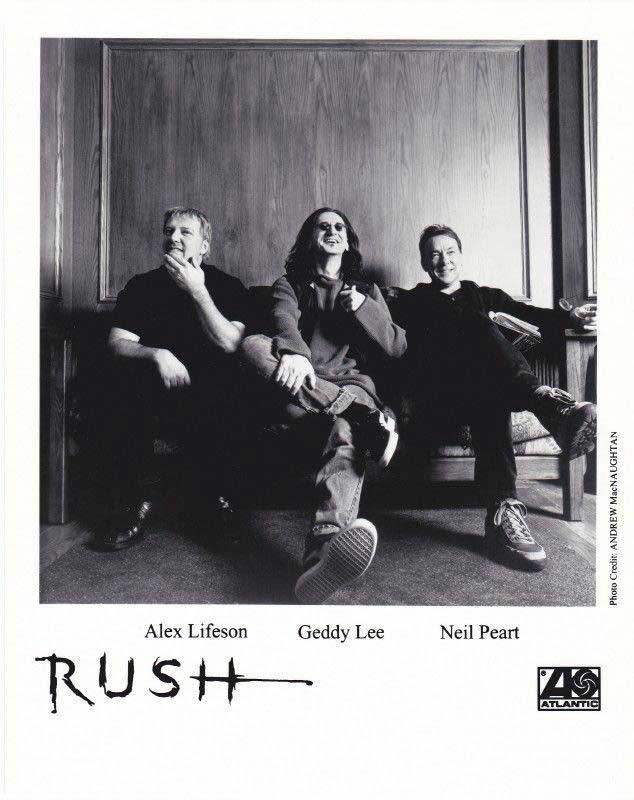Rush Takes Things Slow In Studio
By Chris Macias, Sacramento Bee, September 11, 2002, transcribed by pwrwindows

During four years, the progressive-rock power trio known as Rush had ground to a halt. In 1997, the daughter of drummer Neil Peart was killed in a car accident. Less than a year later, Peart's wife succumbed to cancer.
While Peart recovered from his double dose of tragedy, Geddy Lee recorded a solo album and guitarist Alex Lifeson concentrated on producing bands. Rush had splintered in three different directions, and there was some question as to whether the group would join forces again.
But Rush has arisen a new. The band, which is nearing 30 years on the music scene, released an album in May (Vapor Trails). Rush is also back on the concert trail.
Rush's dark days, it seems, are over.
"In the summer of 2000, we weren't very optimistic," said Lifeson, in a recent phone interview. "Neil's recovery was very difficult and it seemed like he was going into a darker period. Geddy and I started to keep ourselves busy in other areas. Inside I felt that this was it, and it was unlikely that Neil would want to comeback.
"For us, it was a matter of when (Neil) was ready, and if that day would ever come. But he surprised us all. When it arrived, we sat down and talked about working again."
Reviving Rush, however, required some delicacy. The previous few years were an emotional drain, and the band members had to find its musical groove after being dormant for so long. So instead of jumping into Vapor Trails, Rush rekindled its chemistry in a slow burn.
"We went into the studio in January (2001), and slowly started putting it together," Lifeson said. "For the first two weeks, we didn't do anything but talk. We fiddled around with equipment and then started writing. It was a couple of months before we got any material that was leading us in a direction."
In total, Rush spent 14 months working on Vapor Trails - about three times longer than the band had ever spent recording an album. Still, Rush came out of this extended session with a bare-knuckles sound. Juicy guitar solos and sinewy keyboard lines - both Rush trademarks - are virtually nonexistent on Vapor Trails. Lee'susual helium-voiced wails are also toned down, and the band favors straight-ahead rhythms over its normal flair for tricky time signatures.
"We decided not to have restrictions on time (in the studio),"Lifeson said. "We needed to do something fresh in approach, and we didn't want to work like we had in the past. We thought this was a great time to be more organic. I didn't think (guitar solos) were an important feature in songs. It was more important to get an instrumental thing happening with Geddy and Neil."
On its current tour, the band is playing only a handful of tunes from Vapor Trails. So Rush is digging way back into its catalog for its nearly three-hour show.
But to reach back into Rush's days of yore, the band members needed to shed some musical rust.
"We'd gone through a lot of rehearsals, and for the first three weeks we sounded like a really bad Rush tribute band," Lifeson said. "And then we sounded like an OK Rush tribute band for a couple weeks. It wasn't until the last week or two of full production rehearsals that we sounded anything like we're supposed to sound."
But Rush's return has met belated critical respect. Though the band has sold more than 35 million records, Rush's high-concept albums and epic overtones had long been slagged by music critics. Reviews forVapor Trails and the latest Rush tour, however, have been wholly positive.
"It feels nice because we feel so strongly about the record," Lifeson said. "We've always had a funny relationship with a lot of rock writers. But we are what we are. We've always done exactly what we think we should be doing and what makes us happy. It may not be trendy, or mainstream, or cool. But maybe after everything we've been through, and the fact we're still around 28 years later, we're getting, begrudgingly, some respect.
"In a lot of ways, we feel stronger than ever," Lifeson added. "I think this whole tragic event in Neil's life really brought us close together and our support of him is something he's never going to forget. We all have a friendship that runs really deeply. We're just lucky to be able to work together."